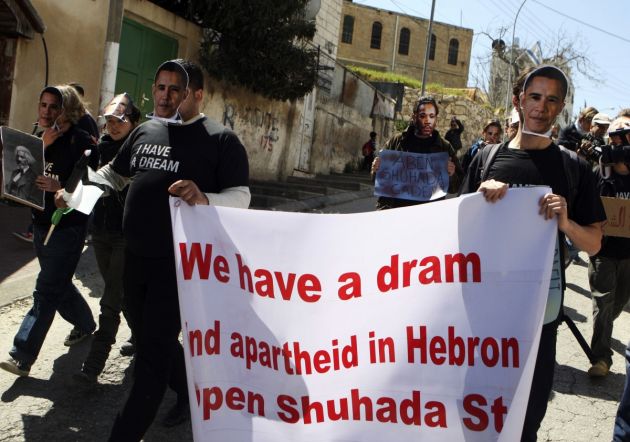Obama arrives in Israel, vows undying support

JERUSALEM (Reuters) - Making his first official visit to Israel, President Barack Obama pledged on Wednesday unwavering commitment to the security of the Jewish State where concern over a nuclear-armed Iran has clouded bilateral relations.
He also stressed the need for Middle East peace at the start of a three-day trip aimed at resetting fraught relations with both the Israelis and Palestinians. But U.S. officials have said Obama had come to listen and had no new initiatives to offer.
Descending from Air Force One in bright Spring sunshine, Obama briefly embraced Israeli Prime Minister Benjamin Netanyahu, with whom he has notoriously testy ties, before offering smiles and handshakes to waiting ranks of ministers.
"I see this visit as an opportunity to reaffirm the unbreakable bond between our nations, to restate America's unwavering commitment to Israel's security and to speak directly to the people of Israel and to your neighbors," Obama said at a red-carpet welcoming ceremony at Tel Aviv airport.
"I am confident in declaring that our alliance is eternal, is forever," he said, adding the Hebrew word for forever -- "Lanetzach" -- to emphasis the upbeat message.
Obama faces strong doubts among Israelis over his pledge to prevent a nuclear-armed Iran and concerns that the civil war in neighboring Syria might spill over the border.
In his own welcoming remarks, Netanyahu cited an Israeli right to self-defense, which he said Obama supported.
"Thank you for unequivocally affirming Israel's sovereign right to defend itself by itself against any threat," the right-wing Israeli leader said before viewing with Obama an Iron Dome anti-missile battery that was brought to the airport for the president to see. The system is partially U.S.-funded.
Annual U.S. military aid to Israel is put at $3 billion.
Speaking on the tarmac, Obama voiced of his hopes for peace - without directly mentioning Palestinians.
"We stand together because peace must come to the Holy Land," Obama said. "Even as we are clear eyed about the difficulties, we will never lose sight of the vision of an Israel at peace with its neighbors."
U.S.-sponsored peace talks between Israel and the Palestinians have been stalled since 2010 in a dispute over Israeli settlement-building in the occupied West Bank.
Obama travels briefly to the occupied West Bank on Thursday for talks with Palestinian President Mahmoud Abbas and will fly on to Jordan on Friday.
LACK OF SUBSTANCE
Shortly after reaching Tel Aviv, the U.S. president and his delegation flew the short distance to Jerusalem in a fleet of helicopters. He was due to hold several hours of talks with Netanyahu later in the day and a joint news conference was scheduled for 8:10 p.m. (2.10 a.m. EDT).
The White House has deliberately minimized hopes of any major breakthroughs, a reversal from Obama's first four years in office when aides said he would visit the Jewish state only if he had something concrete to accomplish.
Hundreds of U.S. and Israel flags have been hung on lamp posts across Jerusalem, as well as banners that boast of "an unbreakable alliance". But the apparent lack of any substantial policy push has bemused many diplomats and analysts.
"This seems to me to be an ill-scheduled and ill-conceived visit," said Gidi Grinstein, president of the Reut Institute, a Tel Aviv-based think tank.
With both Obama and Netanyahu just starting new terms and mindful that they will have to work together on volatile issues for years to come, they will be looking to avoid the kind of public confrontation that has marked past encounters.
"To tell the truth, they can't stand one another," a commentator for Israel's Channel 10 television said in a live broadcast from the airport as Air Force One came to a halt.
Seeking to connect directly with an often skeptical Israeli public, Obama will make a speech to a group of carefully screened students on Thursday afternoon where he is expected to touch on major topics of concern, including Iran.
Israel and the United States agree that Iran should never get a nuclear bomb, dismissing Tehran's assertion that its atomic program is peaceful. However, the two allies are at odds over how fast the clock is ticking down on the need for preventative military action should diplomacy fail.
U.S. officials say Obama, the fifth sitting U.S. president to travel to Israel, will urge further patience, with Washington worried that a threatened Israeli unilateral strike might drag the United States into another Middle East war.
Obama, who has said he is coming to listen, will fly by helicopter the short distance between Jerusalem and the West Bank city of Ramallah to meet Abbas, avoiding having to go through the Israeli separation barrier that divides the two entities.
Abbas's allies have expressed bitter disappointment over the lack of fresh U.S. moves. "It's not a positive visit," said Wasel Abu Yousef, a senior official in the Palestine Liberation Organization, led by Abbas.
Netanyahu told Obama at the airport that he was committed to securing peace with the Palestinians, but Western diplomats in Jerusalem remain largely skeptical.
The Israeli leader has just forged a coalition government that contains fervent supporters of settlement building in the West Bank, which the U.S. has strongly criticized as a major impediment to lasting peace with the Palestinians.
Along the reception line, Obama stopped only briefly to shake hands with pro-settler leader Naftali Bennett, but had a long exchange with new Finance Minister Yair Lapid, who heads a centrist movement and has said peace-making is a priority.
(Additional reporting by Steve Holland, Ori Lewis and Jeffrey Heller in Jerusalem and Noah Browning in Ramallah; Editing by Jeffrey Heller and Giles Elgood)